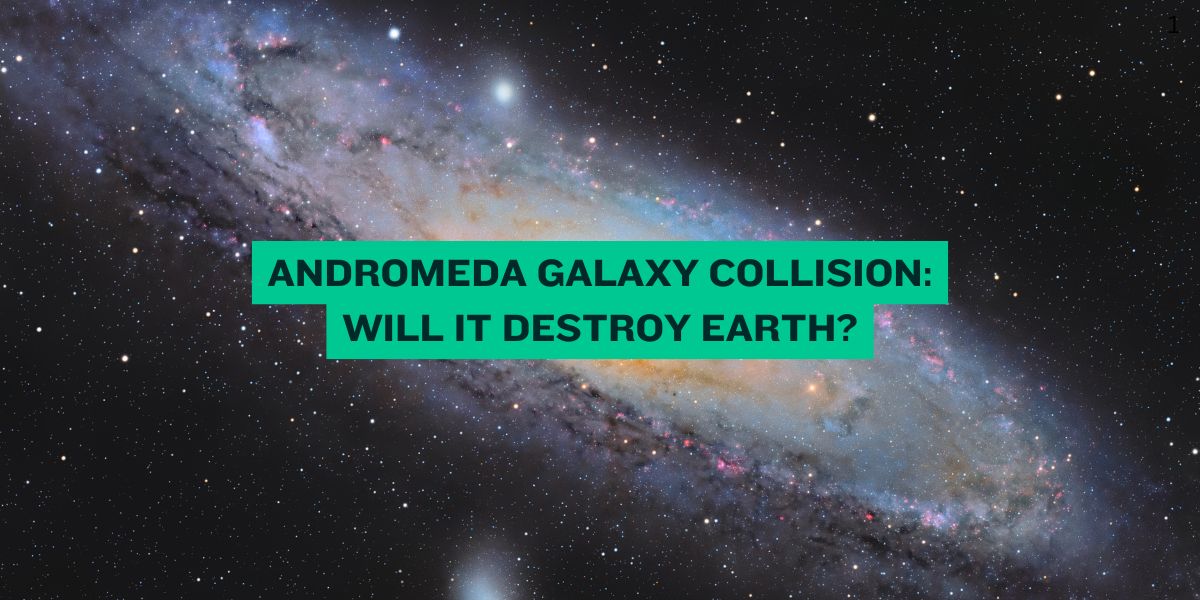Look up at the night sky. Do you see a faint, fuzzy patch? That’s the Andromeda Galaxy, our closest galactic neighbor. It’s huge, beautiful, and, believe it or not, heading straight toward us!
Scientists say the Milky Way (our galaxy) and Andromeda will crash into each other one day. But don’t panic! This won’t happen for billions of years. Still, it’s fun to imagine what will happen when two galaxies collide. Will Earth survive? Will stars explode?
What do you think will happen when these two giants meet?
What Is the Andromeda Galaxy?
The Andromeda Galaxy is a massive collection of stars, gas, and dust. It’s the closest spiral galaxy to the Milky Way. Here are some cool facts:
- It’s about 2.5 million light-years away. (That means light from Andromeda takes 2.5 million years to reach us!)
- It’s even bigger than our Milky Way.
- You can see it with just your eyes on a dark, clear night.
Think of it like a giant city of stars, floating in space. And one day, it’s going to bump into our own star city, the Milky Way!
Will the Milky Way and Andromeda Collide?
Yes! But not anytime soon. Scientists predict the collision will happen in about 4.5 billion years. That’s a very, very long time from now.
When galaxies collide, they don’t crash like cars. Instead, they merge slowly. Stars and planets are so far apart that most won’t even hit each other. Instead, gravity will pull the two galaxies together, changing their shapes forever.
Fun fact: This kind of collision has happened before in the universe. Many galaxies we see today were formed by mergers!
Will Earth Be Destroyed in the Collision?
Good news: Earth will probably not be destroyed. Here’s why:
- Space is mostly empty. Even though galaxies have billions of stars, the distance between them is huge. The chance of stars colliding is very low.
- The Sun might still be around. In 4.5 billion years, the Sun will grow into a red giant, which could affect Earth. But the galaxy collision itself won’t wipe out our planet.
- Earth might move to a new place. Gravity could push our solar system into a different part of the merged galaxy.
So, no need to worry, Earth will likely survive the crash!
What Will the Night Sky Look Like After the Collision?
Imagine looking up and seeing two galaxies in the sky instead of one! As Andromeda gets closer, it will appear bigger and brighter.
When the galaxies merge, the night sky will change:
- New stars will form from gas and dust collisions.
- The Milky Way’s shape will disappear, turning into a new, mixed galaxy.
- Brighter, crowded skies might happen as stars get closer.
It will be a beautiful, slow dance of stars, but we won’t be around to see it!
What Will the New Galaxy Be Called?
After the Milky Way and Andromeda merge, they’ll form a brand-new galaxy. Scientists have already given it a fun nickname: Milkomeda (Milky Way + Andromeda).
Milkomeda will be a giant elliptical galaxy, big, round, and full of stars. Our solar system will just be a tiny part of this new cosmic neighborhood.
Conclusion
The Andromeda Galaxy is coming for us, but don’t worry! The collision won’t happen for billions of years, and Earth will probably be just fine. Instead of destruction, we’ll get a new galaxy, new stars, and maybe even a new night sky view.
Isn’t it amazing how the universe keeps changing? What do you think future humans (or aliens!) will call our new galaxy?
📌 Frequently Asked Questions
How far is the Andromeda Galaxy from Earth?
The Andromeda Galaxy is about 2.5 million light-years away. That means its light takes 2.5 million years to reach us.
Can we see the Andromeda Galaxy with the naked eye?
Yes! On a dark, clear night, you can see it as a faint, fuzzy patch in the sky.
Will the Sun survive the Andromeda collision?
The Sun will still exist, but it may become a red giant around the same time, which could affect Earth.
Will humans survive the galaxy collision?
Humans (if we still exist) will face bigger problems before then, like the Sun’s changes. The collision itself won’t wipe us out.
How do scientists know the galaxies will collide?
They study the movement of Andromeda and see that it’s moving toward the Milky Way due to gravity.
Has a galaxy collision ever happened before?
Yes! Many galaxies we see today were formed by mergers. The universe is full of colliding galaxies.
Will stars crash into each other during the collision?
Very unlikely. Space is so big that stars almost never hit each other.
What will happen to the black holes in both galaxies?
The supermassive black holes in the Milky Way and Andromeda will merge into one even bigger black hole.
Will the collision affect our solar system?
Our solar system might get pushed to a new part of the galaxy, but planets will stay safe.
Can we stop the Andromeda collision?
No, galaxies move because of gravity, and we can’t change that. But we don’t need to stop it because it won’t harm Earth.
